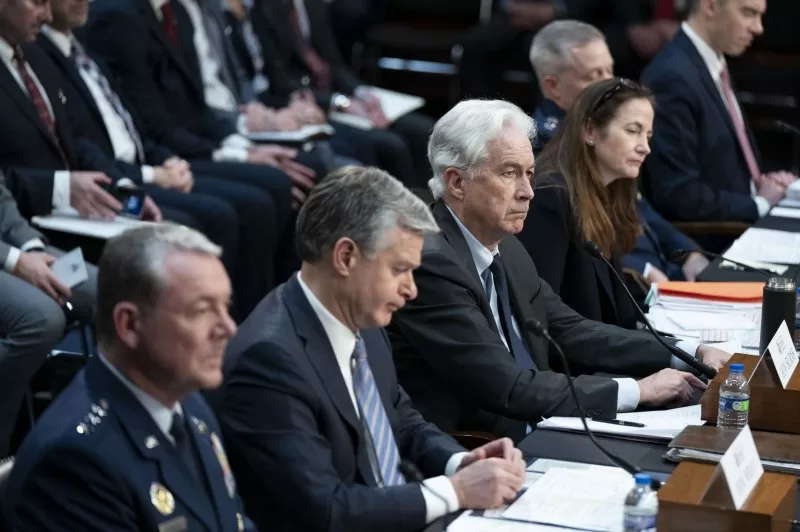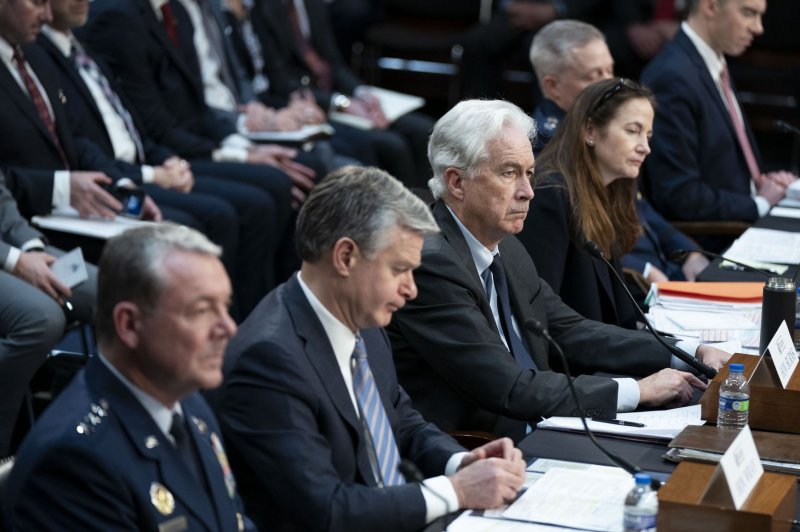1 of 5 | Director of the Central Intelligence Agency William Burns looks on Monday during a Senate Intelligence Committee hearing to “examine worldwide threats” with other leaders of intelligence agencies at the U.S. Capitol in Washington, D.C. Photo by Bonnie Cash/UPI |
License PhotoMarch 11 (UPI) — U.S. intelligence officials testified before a Senate committee Monday on the state of worldwide security threats to the United States, including artificial intelligence, election security and misinformation by U.S. adversaries, as they warned of an “increasingly fragile world order.”
“Today, the United States faces a complex and interconnected threat,” Director of National Intelligence Avril Haines told the Senate Intelligence Committee, which holds a hearing each year to address top U.S. threats.
In addition to threats related to terrorism, cybercrime, corruption, narcotics trafficking and climate change, Haines warned of threats caused by regionalized conflicts, as well as major authoritarian powers who are “actively working to undermine the rules-based order and the open international system, the United States and our partners rely on for trade, commerce, and the free flow of information.”
“The threat of malign actors exploiting these tools and technology to undercut U.S. interests and democracy is particularly potent as voters go to the polls in more than 60 elections around the globe this year,” Haines said.
The hearing, which also included testimony from CIA Director Bill Burns and FBI Director Christopher Wray, covered ongoing support for Ukraine in its war with Russia, the Israel-Hamas war, competition with China and its efforts to manipulate the 2024 presidential election, as well as security at the U.S. southern border.
“From an FBI perspective, we are seeing a wide array of very dangerous threats that emanate from the border and that includes everything from the drug trafficking. The FBI alone seized enough fentanyl in the last two years to kill 270 million people,” Wray told lawmakers while expressing concern that some people, who are crossing border and evading law enforcement, intend harm.
“Some of the overseas facilitators of a smuggling network have ISIS ties that we’re very concerned about and that we’ve been spending an enormous amount of effort with our partners investigating exactly what that network is up to,” Wray said, as the focus of the hearing turned to China and the 40-page report released last month by the intelligence community.
The United States is facing “an ambitious but anxious China, a confrontational Russia, some regional powers such as Iran, and more capable non-state actors who are challenging longstanding rules of the international system as well as U.S. primacy within it,” the report states.
Wray warned TikTok is controlled by the Chinese Communist Party and poses a significant concern to national security.
Republican Sen. Marco Rubio of Florida questioned Wray about whether ByteDance, under Chinese law, could be forced by the CCP to change their algorithm “so that Americans start seeing videos that hurt this candidate or help that candidate in the upcoming election.”
Wray replied, “That’s my understanding,” adding that “that kind of influence operation, or the different kinds of influence operations you’re describing, are extraordinarily difficult to detect, which is part of what makes the national security concerns represented by TikTok so significant.”
“Chinese leaders believe it is essential to project power globally in order to be able to resist U.S. pressure,” Haines added, before discussing threats caused by regional conflicts around the world, as anti-war protestors shouted at the hearing.
While Haines warned that Iranian-backed terrorist groups are directing supporters to attack Israeli and American interests amid Israel’s ongoing war against Hamas, Burns expressed concern over the dire need for continued U.S. military support for Ukraine, more than two years after Russia’s invasion.
“The Ukrainians are not running out of courage and tenacity, they’re running out of ammunition,” Burns testified. “And we’re running out of time to help them.”

